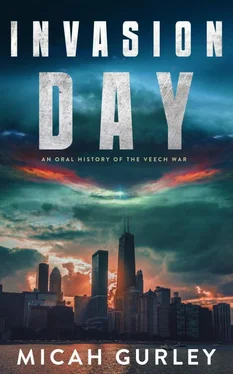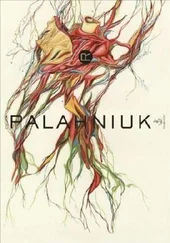The battle was short. In minutes, they almost destroyed the greatest air force the world had ever seen. We took sixty percent causalities before we were ordered to withdraw and head west, finally coming under the protection of surface-to-air missiles that had been rushed out.
Overall, I think the Veech lost a craft or two. That’s it. Then, they let us go. We were nothing to them, an inconvenience at best. They had another objective. Some of my guys wanted to stay and fight, believing we just needed to figure out their weaknesses. They were lost in a battle rage. But orders were orders, and we needed to regroup if we could.
A few pilots refused to leave, veterans of fifteen years and experts in their fields who just lost it. I know one of them had family in L.A. We didn’t know at the time, but they were already dead. I guess he thought he was defending them and wouldn’t let go. I don’t know. These pilots cut communication to the wing. A couple of them crashed into the troop shuttles, hoping to take out just one more. They did, but it was an enormous waste of life. Nobody said it, but we knew we couldn’t stop the Veech. The best we could do was regroup and hope someone came up with a way to at least give us a fighting chance.
That battle…that battle changed everything. Before the battle, the pilots of the U.S. knew we would win. We might lose people, sure, but we knew we would win in a fight. Even in this battle, the pride and confidence of flying with our whole command and hundreds of other pilots was exhilarating. We had the most experienced pilots in the world, the best technology, a history that couldn’t be questioned.
Then, we lost. More than lost, we were almost destroyed. Not just in a physical sense; our confidence was shattered too. Fear gripped us. A fear of letting America down, of being too weak to stand and fight, of seeing the people we loved killed. We weren’t the best anymore. Far from it, we were obsolete.
Out of the sixty-five aircraft in my command, twenty-eight landed. Some of the other aircraft had higher survival rates than us because the F-35 wasn’t primarily an air combat platform. The Raptors did much better, as their ariel maneuverability is much higher than ours, and that allowed them to keep out of reach and react faster.
After the landings, we watched as the Veech organized and deployed troops in different directions. It was tough watching their troops head into America unmolested and knowing we couldn’t do anything about it. My guys stayed quiet, dealing with their issues and preparing themselves for the next round. We thought it would be soon.
We wanted to fight but didn’t know how to engage correctly. Two days passed. My men were jumpy, and morale was understandably low. By this point, I knew what had happened. High command simply didn’t exist anymore, and those officers who survived, well, they weren’t ready for it. No one was. Yeah, it wasn’t a great time for us.
Our break came when the Jhi showed up. I don’t know the exact number, but I’d say about forty percent of the Veech interceptors on Earth headed back into space to defend the transports. There were still enough on Earth to baffle us, but things looked better.
We watched the battle in space, along with the rest of the world. I can tell you, I felt my first sense of hope then. I didn’t know who they were, but they gave us time and took the Veech down to boot. Anything else didn’t matter at that moment. We saw the Veech transition out, and that was a glorious sight. Nothing was over, but everything had changed.
My wing spent the next five years fighting the Veech, though there were no more great air battles. The Veech had enough interceptors to keep us from bombing their ground troops, but not enough to attack us and still leave their forces protected. Their shuttles were nothing to laugh at either. They were slower, fatter, and had weaker shields but were still formidable to us.
It turned into a war of strafing runs and dancing with the Veech, as ground battles raged underneath us. The first two years were the roughest. The Veech still had a lot of interceptors then, and we couldn’t commit to a large confrontation. We worked in conjunction with the ground forces because we needed their portable SAMs to keep the Veech back. It would have been nice to drop bombs on their bases, but it just wasn’t possible to get close to them. They would have eaten us up. We threatened battle a few times to keep them honest and make sure they kept their interceptors at home instead of strafing our troops, but nothing came of it. The ground forces had to do it step by step, yard by yard.
Toward the fourth year of the war, TSC had been formed, and the world’s air forces slowly began to morph into one. We started to receive interceptors of our own that came from some dealings with the Jhi. They weren’t as capable as the Veech’s, but they were close. We had good pilots that pushed those things. We regained our confidence and pride.
Eventually, we pushed the Veech back to their beachheads: L.A., Houston, and D.C., and we pounded them. That’s where most of the remaining Veech died. They sent out teams to destroy infrastructure and cause disruptions, but no aircraft were involved in that except for those specifically designated for the Hunter-Killer teams.
What are your thoughts on the TSC forcing out veterans who served their nations?
I understand it. The TSC wanted people loyal to Earth, not their home countries. Remember that didn’t start right away, not until about five years after the battle for Earth was over. For the first five years, it was just survival and trying to get the Veech off the Earth, then switching over to preparing for another visit from them. We were under the clock or thought we were. We didn’t know when and if the Veech would return. All of the pilots in the TSC at that point were highly decorated veterans with years of military service. We had more pilots than interceptors and still do. Those pilots will remain until the new TSC candidates are ready to take over. Until then, pilots from around the world will hold the gate.
Was it hard to go from a one-star admiral to a commercial pilot?
(He laughs.)No, it was okay. I served my time, did my job. I have a family, and it’s nice to be ground side. The Earth lost a lot of people, and I’m still needed. I’m a pilot trainer for commercial shuttles. It takes a while to get used to alien tech, even though we’ve made it human-friendly. It’s kind of a tradition for old military pilots to become bus drivers. And the benefits aren’t bad either, last night I took my wife to dinner in Paris. We were back by ten.
Lynchburg, Virginia
I’m sitting in a 60s style diner when Jackson “the Anchor” Thompson enters. He’s a man in his early 50s who stands a little taller than six feet. He’s in good shape, his short blond hair turning pure white.
He gives me a nod while he leads the older man next to him, his father. His father stood close to seven feet when he was younger. Though he stoops, his once-massive shoulders still show the size of the man. Jackson pulls out a chair and directs his father to the chair. His father sits down obediently and seems to melt in the chair.
The Ancor looks at me, his deep blue eyes demand my attention, and I feel a little intimidated even meeting them. He thanks me for waiting; he’d been a bit late. We order some burgers and fries, and he asks what I want to know about. I tell him, and he leans back in the chair and glances at his father.
(He sat silent for a minute.)Do you have kids? No, you’re probably too young. I got married late, almost 35, and didn’t have my son until I was 40. Before that, I’d traveled the world, spent my time in the military, really just did what I wanted to. I didn’t have any responsibility. When I had my son, though… it was surreal. It was life-changing. Here was a living being that I’d helped create, one that depended on me for everything. Such responsibility, such love. From that moment on, he was my priority, my everything. We lost his mother shortly after his birth, problems with the pregnancy and her being older. It was just him and me, and of course, (He points at the older man.)this ancient giant.
Читать дальше












